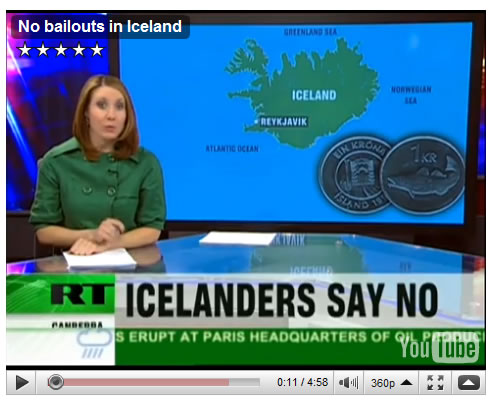Iceland Votes No to Repaying Icesave Debt to Britain and Netherlands
Politics / Credit Crisis 2010 Mar 09, 2010 - 03:10 PM GMT People in Iceland have rejected their government's pledge to repay a debt of more than US$5 billion left by the collapse of Icesave Internet bank. 93 per cent of people voted “no” in a referendum.
People in Iceland have rejected their government's pledge to repay a debt of more than US$5 billion left by the collapse of Icesave Internet bank. 93 per cent of people voted “no” in a referendum.
Andrew Gavin Marshall from the Center for Research on Globalization says the public should not have to shoulder the burden of mistakes made by banks.
“The bailout would be for roughly US$5.4 billion, which would go to the Dutch and the British depositors in Icesave, which was the largest online bank that went under,” Marshall says. “And this is basically asking the Icelandic people to pay for the bad debts of their bankers and the bad regulations of their government. And it’s sort of endemic of this corporatist economic undertaking that is going on around the world, where the private debt has become a public obligation. So you privatize profit and you socialize the risk.”
Andrew G. Marshall is a Research Associate of the Centre for Research on Globalization (CRG). He is currently studying Political Economy and History at Simon Fraser University.
Andrew G. Marshall is a frequent contributor to Global Research. Global Research Articles by Andrew G. Marshall© Copyright Andrew G. Marshall , Global Research, 2010
Disclaimer: The views expressed in this article are the sole responsibility of the author and do not necessarily reflect those of the Centre for Research on Globalization. The contents of this article are of sole responsibility of the author(s). The Centre for Research on Globalization will not be responsible or liable for any inaccurate or incorrect statements contained in this article.
© 2005-2022 http://www.MarketOracle.co.uk - The Market Oracle is a FREE Daily Financial Markets Analysis & Forecasting online publication.




